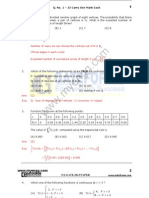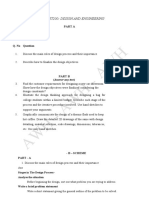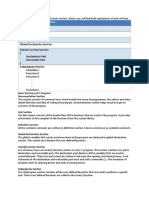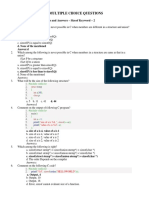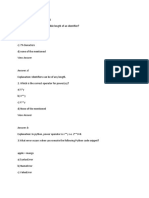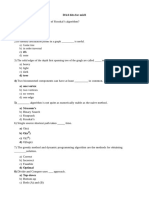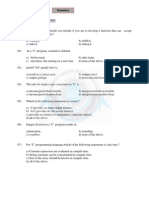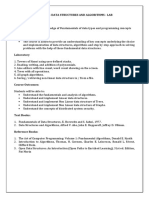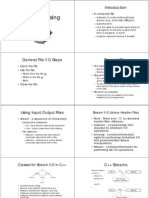C MCQ
C MCQ
Uploaded by
bhuvangatesCopyright:
Available Formats
C MCQ
C MCQ
Uploaded by
bhuvangatesOriginal Description:
Original Title
Copyright
Available Formats
Share this document
Did you find this document useful?
Is this content inappropriate?
Copyright:
Available Formats
C MCQ
C MCQ
Uploaded by
bhuvangatesCopyright:
Available Formats
C Programming Questions and Answers – Standard Input & Output – 1
Which among the following is the odd one out?
a) printf
b) fprintf
c) putchar
d) scanf
Answer: d
2. For a typical program, the input is taken using _________
a) scanf
b) Files
c) Command-line
d) All of the mentioned
Answer: d
3. What does the following command line signify?
prog1|prog2
a) It runs prog1 first, prog2 second
b) It runs prog2 first, prog1 second
c) It runs both the programs, pipes output of prog1 to input of prog2
d) It runs both the programs, pipes output of prog2 to input of prog1
Answer: c
4. What is the default return-type of getchar()?
a) char
b) int
c) char *
d) reading character doesn’t require a return-type
Answer: b
5. What is the value of EOF?
a) -1
b) 0
c) 1
d) 10
Answer: a
6. What is the use of getchar()?
a) The next input character each time it is called
b) EOF when it encounters end of file
c) The next input character each time it is called EOF when it encounters end of file
d) None of the mentioned
Answer: c
7. Which of the following statement is true?
a) The symbolic constant EOF is defined in <stdio.h>
b) The value is -1
c) The symbolic constant EOF is defined in <stdio.h> & value is -1
d) Only value is -1
Answer: c
8. What is the return value of putchar()?
a) The character written
b) EOF if an error occurs
c) Nothing
d) Both character written & EOF if an error occurs
Answer: d
2 B.BHUVANESWARAN | AP (SG) | CSE | Rajalakshmi Engineering College
C Programming Questions and Answers – Standard Input & Output – 2
1. Which is true about function tolower?
a) The function tolower is defined in <ctype.h>
b) Converts an uppercase letter to lowercase
c) Returns other characters untouched
d) None of the mentioned
Answer: d
2. What will be the output of the following C code?
#include <stdio.h>
int main()
{
char c = '\0';
putchar(c);
return 0;
}
a) Compile time error
b) Nothing
c) 0
d) Undefined behaviour
Answer: b
3. putchar(c) function/macro always outputs character c to the __________
a) screen
b) standard output
c) depends on the compiler
d) depends on the standard
Answer: b
4. What will be the output of the following C code if following commands are used to run
(considering myfile exists)?
1. gcc -otest test.c
2. ./test < myfile
3.
4. #include <stdio.h>
5. int main()
6. {
7. char c = 'd';
8. putchar(c);
9. }
a) Compile time error (after first command)
b) d in the myfile file
c) d on the screen
B.BHUVANESWARAN | AP (SG) | CSE | Rajalakshmi Engineering College 3
d) Undefined behaviour
Answer: c
5. What will be the output of the following C code if following commands are used to run
(considering myfile exists)?
1. gcc -otest test.c
2. ./test > myfile
3.
4. #include <stdio.h>
5. int main(int argc, char **argv)
6. {
7. char c = 'd';
8. putchar(c);
9. printf(" %d\n", argc);
10. }
a) d 2 in myfile
b) d 1 in myfile
c) d in myfile and 1 in screen
d) d in myfile and 2 in screen
Answer: b
6. What will be the output of the following C code if following commands are used to run and
if myfile does not exist?
1. gcc -o test test.c
2. ./test > myfile
3.
4. #include <stdio.h>
5. int main(int argc, char **argv)
6. {
7. char c = 'd';
8. putchar(c);
9. printf(" %d\n", argc);
10. }
a) d 2 in myfile
b) d 1 in myfile
c) Depends on the system
d) Depends on the standard
Answer: b
7. The statement prog < infile causes _________
a) prog to read characters from infile
b) prog to write characters to infile
c) infile to read characters from prog instead
d) nothing
Answer: a
4 B.BHUVANESWARAN | AP (SG) | CSE | Rajalakshmi Engineering College
C Programming Questions and Answers – Formatted Output – 1
1. What will be the output of the following C code?
#include <stdio.h>
int main()
{
int i = 10, j = 2;
printf("%d\n", printf("%d %d ", i, j));
return 0;
}
a) Compile time error
b) 10 2 4
c) 10 2 2
d) 10 2 5
Answer: d
2. What will be the output of the following C code?
#include <stdio.h>
int main()
{
int i = 10, j = 3;
printf("%d %d %d", i, j);
return 0;
}
a) Compile time error
b) 10 3
c) 10 3 some garbage value
d) Undefined behaviour
Answer: c
B.BHUVANESWARAN | AP (SG) | CSE | Rajalakshmi Engineering College 5
3. What will be the output of the following C code?
#include <stdio.h>
int main()
{
int i = 10, j = 3, k = 3;
printf("%d %d ", i, j, k);
return 0;
}
a) Compile time error
b) 10 3 3
c) 10 3
d) 10 3 somegarbage value
Answer: c
4. What will be the output of the following C code?
#include <stdio.h>
int main()
{
char *s = "myworld";
int i = 9;
printf("%*s", i, s);
return 0;
}
a) myworld
b) myworld (note: 2 spaces to the left of myworld)
c) myworld (note: followed by two spaces after myworld)
d) Undefined
Answer: b
5. What will be the output of the following C code?
#include <stdio.h>
int main()
{
char *s = "myworld";
int i = 3;
printf("%10.*s", i, s);
return 0;
}
a) myw (note: 7 spaces to the left of myw)
b) myworld(note:2 spaces before myworld)
c) myworld (note:2 spaces after myworld)
6 B.BHUVANESWARAN | AP (SG) | CSE | Rajalakshmi Engineering College
d) myw (note: 7 spaces after myworld)
Answer: a
6. What is the difference between %e and %g?
a) %e output formatting depends on the argument and %g always formats in the format [-
]m.dddddd or [-]m.dddddE[+|-]xx where no.of ds are optional
b) %e always formats in the format [-]m.dddddd or [-]m.dddddE[+|-]xx where no.of ds are
optional and output formatting depends on the argument
c) No differences
d) Depends on the standard
Answer: b
7. Escape sequences are prefixed with ________
a) %
b) /
c) ”
d) None of the mentioned
Answer: d
8. What is the purpose of sprintf?
a) It prints the data into stdout
b) It writes the formatted data into a string
c) It writes the formatted data into a file
d) None of the mentioned
Answer: b
9. The syntax to print a % using printf statement can be done by ________
a) %
b) \%
c) ‘%’
d) %%
Answer: d
B.BHUVANESWARAN | AP (SG) | CSE | Rajalakshmi Engineering College 7
C Programming Questions and Answers – Formatted Output – 2
1. What is the meaning of the following C statement?
printf(“%10s”, state);
a) 10 spaces before the string state is printed
b) Print empty spaces if the string state is less than 10 characters
c) Print the last 10 characters of the string
d) None of the mentioned
Answer: b
2. What are the Properties of the first argument of a printf() functions?
a) It is defined by a user
b) It keeps the record of the types of arguments that will follow
c) There may no be first argument
d) None of the mentioned
Answer: b
4. What will be the output of the following C code?
#include <stdio.h>
int main()
{
int i = 10, j = 3;
printf("%d %d %d", i, j);
return 0;
}
a) Compile time error
b) 10 3
c) 10 3 some garbage value
d) Undefined behaviour
Answer: c
8 B.BHUVANESWARAN | AP (SG) | CSE | Rajalakshmi Engineering College
C Programming Questions and Answers – Formatted Input – 1
1. What will be the output of the following C code?
#include <stdio.h>
int main()
{
int n;
scanf("%d", n);
printf("%d", n);
return 0;
}
a) Compilation error
b) Undefined behavior
c) Whatever user types
d) Depends on the standard
Answer: b
2. What will be the output of the following C code?
#include <stdio.h>
int main()
{
char *n;
scanf("%s", n);
return 0;
}
a) Compilation error
b) Undefined behavior
c) Nothing
d) None of the mentioned
Answer: b
3. What will be the output of the following C code?
#include <stdio.h>
int main()
{
char n[] = "hellonworld!";
char s[13];
scanf(n, "%s", s);
printf("%s\n", s);
return 0;
}
a) hellonworld!
b)
hello
B.BHUVANESWARAN | AP (SG) | CSE | Rajalakshmi Engineering College 9
world!
c) hello
d) hello world!
4. What will be the output of the following C code?
#include <stdio.h>
int main()
{
short int i;
scanf("%hd", &i);
printf("%hd", i);
return 0;
}
a) Compilation error
b) Undefined behavior
c) Whatever user types
d) None of the mentioned
Answer: c
5. What will be the output of the following C code?
#include <stdio.h>
int main()
{
short int i;
scanf("%*d", &i);
printf("%hd", i);
return 0;
}
a) Compilation error
b) Some garbage value
c) Whatever user types
d) Depends on the standard
Answer: b
6. What will be the output of the following C code?
#include <stdio.h>
int main()
{
short int i;
scanf("%*hd", &i);
printf("%hd", i);
return 0;
}
10 B.BHUVANESWARAN | AP (SG) | CSE | Rajalakshmi Engineering College
a) Compilation error
b) Some garbage value
c) Whatever user types
d) Depends on the standard
Answer: b
7. What will be the output of the following C code?
#include <stdio.h>
int main()
{
short int i;
scanf("%h*d", &i);
printf("%hd", i);
return 0;
}
a) Compilation error
b) Undefined behavior
c) Some garbage value
d) Depends on the standard.
8. Which of the following is NOT a delimiter for an input in scanf?
a) Enter
b) Space
c) Tab
d) None of the mentioned
Answer: d
9. If the conversion characters of int d, i, o, u and x are preceded by h, it indicates?
a) A pointer to int
b) A pointer to short
c) A pointer to long
d) A pointer to char
Answer: b
B.BHUVANESWARAN | AP (SG) | CSE | Rajalakshmi Engineering College 11
C Programming Questions and Answers – Formatted Input – 2
1. Which of the following doesn’t require an & for the input in scanf()?
a) char name[10];
b) int name[10];
c) float name[10];
d) all of the mentioned
Answer: a
2. Which of the following is an invalid method for input?
a) scanf(“%d%d%d”,&a, &b, &c);
b) scanf(“%d %d %d”, &a, &b, &c);
c) scanf(“Three values are %d %d %d”,&a,&b,&c);
d) none of the mentioned
Answer: d
3. Which of the following represents the function for scanf()?
a) void scanf(char *format, …)
b) int scanf(char *format, …)
c) char scanf(int format, …)
d) char *scanf(char *format, …)
Answer: b
4. What does scanf() function return?
a) Number of successfully matched and assigned input items
b) Nothing
c) Number of characters properly printed
d) Error
Answer: a
5. What will be the output of the following C code?
#include <stdio.h>
int main()
{
int n;
scanf("%d", n);
printf("%d", n);
return 0;
}
a) Prints the number that was entered
b) Segmentation fault
c) Nothing
d) Varies
Answer: c
12 B.BHUVANESWARAN | AP (SG) | CSE | Rajalakshmi Engineering College
6. What will be the output of the following C statement?
int sscanf(char *string, char *format, arg1, arg2, …)
a) Scans the string according to the format in format and stores the resulting values through
arg1, arg2, etc
b) The arguments arg1,arg2 etc must be pointers
c) Scans the string according to the format in format and stores the resulting values through
arg1, arg2, etc, those arguments arg1,arg2 etc must be pointers
d) None of the mentioned
Answer: c
7. The conversion characters d, i, o, u, and x may be preceded by h in scanf() to indicate?
a) A pointer to short
b) A pointer to long
c) Nothing
d) Error
Answer: a
8. What will be the output of the following C code (when 4 and 5 are entered)?
#include <stdio.h>
int main()
{
int m, n;
printf("Enter the numbers : ");
scanf("%d", &n);
scanf("%d", &m);
printf("%d %d", n, m);
return 0;
}
a) Error
b) 4 junkvalue
c) Junkvalue 5
d) 4 5
Answer: d
B.BHUVANESWARAN | AP (SG) | CSE | Rajalakshmi Engineering College 13
C Programming Questions and Answers – Basics of Structures – 1
1. Which of the following are themselves a collection of different data types?
a) string
b) structures
c) char
d) all of the mentioned
Answer: b
2. User-defined data type can be derived by___________
a) struct
b) enum
c) typedef
d) all of the mentioned
Answer: d
3. Which operator connects the structure name to its member name?
a) –
b) <-
c) .
d) Both <- and .
Answer: c
4. Which of the following cannot be a structure member?
a) Another structure
b) Function
c) Array
d) None of the mentioned
Answer: b
5. Which of the following structure declaration will throw an error?
a)
struct temp{}s;
main(){}
b)
struct temp{};
struct temp s;
main(){}
c)
struct temp s;
struct temp{};
main(){}
d) None of the mentioned
Answer: d
14 B.BHUVANESWARAN | AP (SG) | CSE | Rajalakshmi Engineering College
6. What will be the output of the following C code?
#include <stdio.h>
struct student
{
int no;
char name[20];
}
int main()
{
struct student s;
s.no = 8;
printf("hello");
return 0;
}
a) Compile time error
b) Nothing
c) hello
d) Varies
Answer: a
7. What will be the output of the following C code?
#include <stdio.h>
struct student
{
int no = 5;
char name[20];
};
int main()
{
struct student s;
s.no = 8;
printf("hello");
return 0;
}
a) Nothing
b) Compile time error
c) hello
d) Varies
Answer: b
B.BHUVANESWARAN | AP (SG) | CSE | Rajalakshmi Engineering College 15
8. What will be the output of the following C code?
#include <stdio.h>
struct student
{
int no;
char name[20];
};
int main()
{
student s;
s.no = 8;
printf("hello");
return 0;
}
a) Nothing
b) hello
c) Compile time error
d) Varies
Answer: c
What will be the output of the following C code?
#include <stdio.h>
int main()
{
struct student
{
int no;
char name[20];
};
struct student s;
s.no = 8;
printf("%d", s.no);
return 0;
}
a) Nothing
b) Compile time error
c) Junk
d) 8
Answer: d
16 B.BHUVANESWARAN | AP (SG) | CSE | Rajalakshmi Engineering College
10. Can the following C code be compiled successfully?
1. #include <stdio.h>
2. struct p
3. {
4. int k;
5. char c;
6. float f;
7. };
8. int main()
9. {
10. struct p x = {.c = 97, .f = 3, .k = 1};
11. printf("%f\n", x.f);
12. }
a) Yes
b) No
c) Depends on the standard
d) Depends on the platform
Answer: c
B.BHUVANESWARAN | AP (SG) | CSE | Rajalakshmi Engineering College 17
C Programming Questions and Answers – Basics of Structures – 2
1. What will be the output of the following C code?
#include <stdio.h>
int main()
{
struct student
{
int no;
char name[20];
};
struct student s;
no = 8;
printf("%d", no);
return 0;
}
a) Nothing
b) Compile time error
c) Junk
d) 8
Answer: b
2. How many bytes in memory taken by the following C structure?
1. #include <stdio.h>
2. struct test
3. {
4. int k;
5. char c;
6. };
a) Multiple of integer size
b) integer size+character size
c) Depends on the platform
d) Multiple of word size
Answer: a
18 B.BHUVANESWARAN | AP (SG) | CSE | Rajalakshmi Engineering College
3. What will be the output of the following C code?
#include <stdio.h>
struct
{
int k;
char c;
};
int main()
{
struct p;
p.k = 10;
printf("%d", p.k);
return 0;
}
a) Compile time error
b) 10
c) Undefined behaviour
d) Segmentation fault
Answer: a
4. What will be the output of the following C code?
#include <stdio.h>
struct
{
int k;
char c;
} p;
int p = 10;
int main()
{
p.k = 10;
printf("%d %d", p.k, p);
return 0;
}
a) Compile time error
b) 10 10
c) Depends on the standard
d) Depends on the compiler
Answer: a
B.BHUVANESWARAN | AP (SG) | CSE | Rajalakshmi Engineering College 19
5. What will be the output of the following C code?
#include <stdio.h>
struct p
{
int k;
char c;
};
int p = 10;
int main()
{
struct p x;
x.k = 10;
printf("%d %d", x.k, p);
return 0;
}
a) Compile time error
b) 10 10
c) Depends on the standard
d) Depends on the compiler
Answer: b
20 B.BHUVANESWARAN | AP (SG) | CSE | Rajalakshmi Engineering College
6. What will be the output of the following C code?
#include <stdio.h>
struct p
{
int k;
char c;
float f;
};
int p = 10;
int main()
{
struct p x = { 1, 97 };
printf("%f %d", x.f, p);
return 0;
}
a) Compile time error
b) 0.000000 10
c) Some garbage value 10
d) 0 10
Answer: b
7. What will be the output of the following C code according to C99 standard?
#include <stdio.h>
struct p
{
int k;
char c;
float f;
};
int main()
{
struct p x = { .c = 97, .f = 3, .k = 1 };
printf("%f", x.f);
return 0;
}
a) 3.000000
b) Compile time error
c) Undefined behaviour
d) 1.000000
B.BHUVANESWARAN | AP (SG) | CSE | Rajalakshmi Engineering College 21
Answer: a
8. What will be the output of the following C code according to C99 standard?
#include <stdio.h>
struct p
{
int k;
char c;
float f;
};
int main()
{
struct p x = { .c = 97, .k = 1, 3 };
printf("%f", x.f);
return 0;
}
a) 3.000000
b) 0.000000
c) Compile time error
d) Undefined behaviour
Answer: b
9. What will be the output of the following C code according to C99 standard?
#include <stdio.h>
struct p
{
int k;
char c;
float f;
};
int main()
{
struct p x = { .c = 97 };
printf("%f", x.f);
return 0;
}
a) 0.000000
b) Somegarbagevalue
c) Compile time error
d) None of the mentioned
22 B.BHUVANESWARAN | AP (SG) | CSE | Rajalakshmi Engineering College
Answer: a
B.BHUVANESWARAN | AP (SG) | CSE | Rajalakshmi Engineering College 23
C Programming Questions and Answers – Arrays of Structures – 1
1. The correct syntax to access the member of the ith structure in the array of structures is?
Assuming:
struct temp
{
int b;
}s[50];
a) s.b.[i];
b) s.[i].b;
c) s.b[i];
d) s[i].b;
Answer: d
2. Comment on the output of the following C code.
#include <stdio.h>
struct temp
{
int a;
int b;
int c;
};
int main()
{
struct temp p[] = { { 1, 2, 3 }, { 4, 5, 6 }, { 7, 8, 9 } };
return 0;
}
a) No Compile time error, generates an array of structure of size 3
b) No Compile time error, generates an array of structure of size 9
c) Compile time error, illegal declaration of a multidimensional array
d) Compile time error, illegal assignment to members of structure
Answer: a
3. Which of the following uses structure?
a) Array of structures
b) Linked Lists
c) Binary Tree
d) All of the mentioned
Answer: d
4. What is the correct syntax to declare a function foo() which receives an array of structure in
function?
a) void foo(struct *var);
b) void foo(struct *var[]);
c) void foo(struct var);
24 B.BHUVANESWARAN | AP (SG) | CSE | Rajalakshmi Engineering College
d) none of the mentioned
Answer: a
What will be the output of the following C code? (Assuming size of int be 4)
#include <stdio.h>
struct temp
{
int a;
int b;
int c;
} p[] = {0};
int main()
{
printf("%d", sizeof(p));
return 0;
}
a) 4
b) 12
c) 16
d) Can’t be estimated due to ambiguous initialization of array
Answer: b
6. What will be the output of the following C code?
#include <stdio.h>
struct student
{
char *name;
};
struct student s[2];
int main()
{
s[0].name = "alan";
s[1] = s[0];
printf("%s %s\n", s[0].name, s[1].name);
s[1].name = "turing";
printf("%s %s", s[0].name, s[1].name);
return 0;
}
a) alan alan
alan turing
b) alan alan
B.BHUVANESWARAN | AP (SG) | CSE | Rajalakshmi Engineering College 25
turing turing
c) alan turing
alan turing
d) run time error
Answer: a
7. What will be the output of the following C code?
#include <stdio.h>
struct student
{
char *name;
};
struct student s[2], r[2];
int main()
{
s[0].name = "alan";
s[1] = s[0];
r = s;
printf("%s %s", r[0].name, r[1].name);
return 0;
}
a) alan alan
b) Compile time error
c) Varies
d) Nothing
Answer: b
8. What will be the output of the following C code?
#include <stdio.h>
struct student
{
char *name;
};
int main()
{
struct student s[2], r[2];
s[1] = s[0] = "alan";
printf("%s%s", s[0].name, s[1].name);
return 0;
}
a) alan alan
b) Nothing
c) Compile time error
26 B.BHUVANESWARAN | AP (SG) | CSE | Rajalakshmi Engineering College
d) Varies
b)
What will be the output of the following C code?
#include <stdio.h>
struct student
{
};
int main() {
struct student s[2];
printf("%d", sizeof(s));
return 0;
}
a) 2
b) 4
c) 8
d) 0
Answer: d
B.BHUVANESWARAN | AP (SG) | CSE | Rajalakshmi Engineering College 27
C Programming Questions and Answers – Arrays of Structures – 2
1. What will be the output of the following C code?
1. #include <stdio.h>
2. struct point
3. {
4. int x;
5. int y;
6. };
7. void foo(struct point*);
8. int main()
9. {
10. struct point p1[] = {1, 2, 3, 4};
11. foo(p1);
12. }
13. void foo(struct point p[])
14. {
15. printf("%d\n", p[1].x);
16. }
a) Compile time error
b) 3
c) 2
d) 1
Answer: b
2. What will be the output of the following C code?
1. #include <stdio.h>
2. struct point
3. {
4. int x;
5. int y;
6. };
7. void foo(struct point*);
8. int main()
9. {
10. struct point p1[] = {1, 2, 3, 4};
11. foo(p1);
12. }
13. void foo(struct point p[])
14. {
15. printf("%d\n", p->x);
16. }
a) 1
b) 2
c) 3
d) Compile time error
Answer: a
3. What will be the output of the following C code?
28 B.BHUVANESWARAN | AP (SG) | CSE | Rajalakshmi Engineering College
1. #include <stdio.h>
2. struct point
3. {
4. int x;
5. int y;
6. };
7. void foo(struct point*);
8. int main()
9. {
10. struct point p1[] = {1, 2, 3, 4};
11. foo(p1);
12. }
13. void foo(struct point p[])
14. {
15. printf("%d %d\n", p->x, ++p->x);
16. }
a) 1 2
b) 2 2
c) Compile time error
d) Undefined behaviour
Answer: b
4. What will be the output of the following C code?
1. #include <stdio.h>
2. struct point
3. {
4. int x;
5. int y;
6. } p[] = {1, 2, 3, 4, 5};
7. void foo(struct point*);
8. int main()
9. {
10. foo(p);
11. }
12. void foo(struct point p[])
13. {
14. printf("%d %d\n", p->x, p[2].y);
15. }
a) 1 0
b) Compile time error
c) 1 somegarbagevalue
d) Undefined behaviour
Answer: a
5. What will be the output of the following C code?
1. #include <stdio.h>
2. struct point
3. {
B.BHUVANESWARAN | AP (SG) | CSE | Rajalakshmi Engineering College 29
4. int x;
5. int y;
6. };
7. void foo(struct point*);
8. int main()
9. {
10. struct point p1[] = {1, 2, 3, 4, 5};
11. foo(p1);
12. }
13. void foo(struct point p[])
14. {
15. printf("%d %d\n", p->x, p[3].y);
16. }
a) Compile time error
b) 1 0
c) 1 somegarbagevalue
d) None of the mentioned
Answer: c
6. What will be the output of the following C code?
1. #include <stdio.h>
2. struct point
3. {
4. int x;
5. int y;
6. };
7. void foo(struct point*);
8. int main()
9. {
10. struct point p1[] = {1, 2, 3, 4, 5};
11. foo(p1);
12. }
13. void foo(struct point p[])
14. {
15. printf("%d %d\n", p->x, (p + 2).y);
16. }
a) Compile time error
b) 1 0
c) 1 somegarbagevalue
d) Undefined behaviour
Answer: a
7. What will be the output of the following C code?
1. #include <stdio.h>
2. struct point
3. {
4. int x;
5. int y;
6. };
30 B.BHUVANESWARAN | AP (SG) | CSE | Rajalakshmi Engineering College
7. void foo(struct point*);
8. int main()
9. {
10. struct point p1[] = {1, 2, 3, 4, 5};
11. foo(p1);
12. }
13. void foo(struct point p[])
14. {
15. printf("%d %d\n", p->x, (p + 2)->y);
16. }
a) Compile time error
b) 1 0
c) 1 somegarbagevalue
d) undefined behaviour
Answer: b
8. What will be the output of the following C code?
1. #include <stdio.h>
2. struct student
3. {
4. char *c;
5. };
6. void main()
7. {
8. struct student s[2];
9. printf("%d", sizeof(s));
10. }
a) 2
b) 4
c) 16
d) 8
Answer: d
B.BHUVANESWARAN | AP (SG) | CSE | Rajalakshmi Engineering College 31
C Programming Questions and Answers – File Access – 1
1. What are the first and second arguments of fopen?
a) A character string containing the name of the file & the second argument is the mode
b) A character string containing the name of the user & the second argument is the mode
c) A character string containing file pointer & the second argument is the mode
d) None of the mentioned
Answer: a
2. For binary files, a ___ must be appended to the mode string.
a) Nothing
b) “b”
c) “binary”
d) “01”
Answer: b
3. What will fopen will return, if there is any error while opening a file?
a) Nothing
b) EOF
c) NULL
d) Depends on compiler
Answer: c
4. What is the return value of getc()?
a) The next character from the stream is not referred by file pointer
b) EOF for end of file or error
c) Nothing
d) None of the mentioned
Answer: b
5. When a C program is started, O.S environment is responsible for opening file and providing
pointer for that file?
a) Standard input
b) Standard output
c) Standard error
d) All of the mentioned
Answer: d
6. In C language, FILE is of which data type?
a) int
b) char *
c) struct
d) None of the mentioned
Answer: c
32 B.BHUVANESWARAN | AP (SG) | CSE | Rajalakshmi Engineering College
7. What is meant by ‘a’ in the following C operation?
fp = fopen("Random.txt", "a");
a) Attach
b) Append
c) Apprehend
d) Add
Answer: b
8. Which of the following mode argument is used to truncate?
a) a
b) f
c) w
d) t
Answer: c
9. Which type of files can’t be opened using fopen()?
a) .txt
b) .bin
c) .c
d) none of the mentioned
Answer: d
B.BHUVANESWARAN | AP (SG) | CSE | Rajalakshmi Engineering College 33
C Programming Questions and Answers – File Access – 2
1. Which of the following fopen() statements are illegal?
a) fp = fopen(“abc.txt”, “r”);
b) fp = fopen(“/home/user1/abc.txt”, “w”);
c) fp = fopen(“abc”, “w”);
d) none of the mentioned
Answer: d
2. What does the following segment of C code do?
fprintf(fp, "Copying!");
a) It writes “Copying!” into the file pointed by fp
b) It reads “Copying!” from the file and prints on display
c) It writes as well as reads “Copying!” to and from the file and prints it
d) None of the mentioned
Answer: a
3. What is FILE reserved word?
a) A structure tag declared in stdio.h
b) One of the basic data types in c
c) Pointer to the structure defined in stdio.h
d) It is a type name defined in stdio.h
Answer: d
4. What will be the output of the following C code?
1. #include <stdio.h>
2. int main()
3. {
4. FILE *fp = stdin;
5. int n;
6. fprintf(fp, "%d", 45);
7. }
a) Compilation error
b) 45
c) Nothing
d) Depends on the standard
Answer: c
5. What will be the output of the following C code?
1. #include <stdio.h>
2. #include <stdlib.h>
3. int main()
4. {
5. FILE *fp = stdout;
6. int n;
7. fprintf(fp, "%d", 45);
8. }
34 B.BHUVANESWARAN | AP (SG) | CSE | Rajalakshmi Engineering College
a) Compilation error
b) 45
c) Nothing
d) Depends on the standard
Answer: b
6. stdout, stdin and stderr are ________
a) File pointers
b) File descriptors
c) Streams
d) Structure
Answer: a
7. Which of the following statements about stdout and stderr are true?
a) Same
b) Both connected to screen always
c) Both connected to screen by default
d) stdout is line buffered but stderr is unbuffered
Answer: c
8. What will be the output of the following C code?
1. #include <stdio.h>
2. int main()
3. {
4. FILE *fp = stdout;
5. int n;
6. fprintf(fp, "%d ", 45);
7. fprintf(stderr, "%d ", 65);
8. return 0;
9. }
a) 45 65
b) 65 45
c) 65
d) Compilation error
Answer: b
9. What will be the output of the following C code?
1. #include <stdio.h>
2. int main()
3. {
4. FILE *fp = stdout;
5. int n;
6. fprintf(fp, "%d\n ", 45);
7. fprintf(stderr, "%d ", 65);
8. return 0;
9. }
B.BHUVANESWARAN | AP (SG) | CSE | Rajalakshmi Engineering College 35
a) 45 65
b) 65 45
c) 65
d) Compilation error
Answer: a
10. What will be the output of the following C code?
1. #include <stdio.h>
2. int main()
3. {
4. FILE *fp = stdout;
5. int n;
6. fprintf(fp, "%d ", 45);
7. fflush(stdout);
8. fprintf(stderr, "%d", 65);
9. return 0;
10. }
a) 45 65
b) 65 45
c) 45
d) Compilation error
Answer: a
36 B.BHUVANESWARAN | AP (SG) | CSE | Rajalakshmi Engineering College
C Questions and Answers – File Operations – 1
1. Which one of the following is correct syntax for opening a file.
a) FILE *fopen(const *filename, const char *mode)
b) FILE *fopen(const *filename)
c) FILE *open(const *filename, const char *mode)
d) FILE open(const*filename)
Answer: a
Explanation: fopen() opens the named file, and returns a stream, or NULL of the attempt fails.
2. What is the function of the mode ‘ w+’?
a) create text file for writing, discard previous contents if any
b) create text file for update, discard previous contents if any
c) create text file for writing, do not discard previous contents if any
d) create text file for update, do not discard previous contents if any
Answer: b
Explanation: w+ is a mode used to open a text file for update (i. e., writing and reading),
discard previous contents if any.
3. If the mode includes b after the initial letter, what does it indicates?
a) text file
b) big text file
c) binary file
d) blueprint text
Answer: c
Explanation: If the mode consists of letter b after the first letter as in, “rb” or “w+b”, it
indicates binary file.
4. fflush(NULL) flushes all ____________
a) input streams
b) output streams
c) previous contents
d) appended text
Answer: b
Explanation: fflush(FILE *stream) – fflush() causes any buffered but unwritten to be written
on an Output stream. On an input stream, the effect is undefined. fflush(NULL) flushes all
output streams.
B.BHUVANESWARAN | AP (SG) | CSE | Rajalakshmi Engineering College 37
5. _____removes the named file, so that a subsequent attempt to open it will fail.
a) remove(const *filename)
b) remove(filename)
c) remove()
d) fclose(filename)
Answer: a
Explanation: remove(const *filename) removes the named file, so that a subsequent attempt
to open it will fail. It returns non-zero of the attempt fails.
6. What is the function of FILE *tmpfile(void)?
a) creates a temporary file of mode “wb+”
b) creates a temporary file of mode “wb”
c) creates a temporary file of mode ” w”
d) creates a temporary file of mode “w+”
Answer: a
Explanation: A temporary file is created by tmpfile() function of mode “wb+” that will be
automatically removed when closed or when the program terminates normally.
7. What does tmpfile() returns when it could not create the file?
a) stream and NULL
b) only stream
c) only NULL
d) does not return anything
Answer: a
Explanation: tmpfile() returns a stream or NULL if it could not create the file.
8. Choose the right statement for fscanf() and scanf()
a) fscanf() can read from standard input whereas scanf() specifies a stream from which to
read
b) fscanf() can specifies a stream from which to read whereas scanf() can read only from
standard input
c) fscanf() and scanf() has no difference in their functions
d) fscanf() and scanf() can read from specified stream
Answer: b
Explanation: The fscanf() is similar to the scanf() function, except that the first argument of
fscanf() specifies a stream from which to read whereas scanf() can read from standard input.
9. EOF is an integer type defined in stdio. hand has a value ____________
a) 1
b) 0
c) NULL
d) – 1
38 B.BHUVANESWARAN | AP (SG) | CSE | Rajalakshmi Engineering College
Answer: d
Explanation: EOF is an integer type defined in stdio. hand has a value – 1.
10. fwrite() can be used only with files that are opened in binary mode.
a) true
b) false
Answer: a
Explanation: fwrite() can be used to write characters, integers, or structures to a file.
However, fwrite() can be used only with files opened in binary mode.
B.BHUVANESWARAN | AP (SG) | CSE | Rajalakshmi Engineering College 39
C Questions and Answers – File Operations – 2
1. what is the function of fputs()?
a) read a line from a file
b) read a character from a file
c) write a character to a file
d) write a line to a file
Answer: d
Explanation: The fputs() is used to write a line to a file. fputs() syntax can be written as
int fputs(const char *str, FILE *stream);
2. What does the following C code snippet mean?
char *gets(char *s)
a) reads the next input line into the array s
b) writes the line into the array s
c) reads the next input character into the array s
d) write a character into the array
Answer: a
Explanation: gets() reads the next input line into the array s, terminating newline is replaced
with ‘\0’.It returns s, or NULL if end of file or error occurs.
3. Which function will return the current file position for stream?
a) fgetpos()
b) fseek()
c) ftell()
d) fsetpos()
Answer: c
Explanation: The current file position is returned by ftell() function for stream, or -1L on
error.
4. Select the right explanation for the following C code snippet.
int fgetpos(FILE *stream, fpos_t *s)
a) records the current position in stream in *s
b) sets the file position for stream in *s
c) positions stream at the position recorded in *s
d) reads from stream into the array ptr
Answer: a
Explanation:fgetpos() records the current position in stream in *s, for subsequent use by
fsetpos() . The type fpost_t is suitable for recording such values.
40 B.BHUVANESWARAN | AP (SG) | CSE | Rajalakshmi Engineering College
5. Which functions is declared in <errno. h>?
a) fseek()
b) ftell()
c) ferror()
d) fsetpos()
Answer: c
Explanation: ferror() is declared under <errno. h>. ferror() returns non-zero if the error
indicator for stream is set.
6. setvbuf() and setbuf() function controls buffering for the stream.
a) true
b) false
Answer: a
Explanation: setvbuf() and setbuf() controls buffering for the stream. If buff is NULL, buffering
is turned off for the stream.
7. The functions vprintf(), vfprintf(), and vsprintf() are not equivalent to the corresponding
printf() functions except the variable argument list.
a) true
b) false
Answer: b
Explanation: The functions vprintf() , vfprintf() , and vsprintf() are similar to the
corresponding printf() functions except that the variable argument list is replaced by arg.
8. The______function reads atmost one less than the number of characters specified by size
from the given stream and it is stored in the string str.
a) fget()
b) fgets()
c) fput()
d) fputs()
Answer: b
Explanation: The fgets() function reads one less than the number of characters indicated by
the size from the given stream and it is stored in the string str. The fgets() terminates as soon
as it encounters either a newline character, EOF, or other error.
9. What does the following C code snippet mean?
int ungetc(int c, FILE *stream)
a) pushes c back onto a stream
b) deletes c from the stream
c) reads frequency of c in stream
d) no action is taken by the command
B.BHUVANESWARAN | AP (SG) | CSE | Rajalakshmi Engineering College 41
Answer: a
Explanation: ungetc() pushes c back onto stream, where it will be returned on the next read.
Only one character of pushback per stream is Guaranteed.
10. Choose the correct difference between getc() and fgetc().
a) If it is not a macro, it may evaluate stream more than once
b) if it is amacro, it may not evaluate stream more than once
c) if it is a macro, it may evaluate stream more than once
d) no difference between fgetc() and getc()
Answer: c
Explanation: getc() is equivalent to fgetc() except that if it is a macro, it may evaluate more
than once.
42 B.BHUVANESWARAN | AP (SG) | CSE | Rajalakshmi Engineering College
You might also like
- CS8391-Data Structures-Anna University Question PapersDocument8 pagesCS8391-Data Structures-Anna University Question Papersbhuvangates75% (4)
- Virtual CP InterfaceDocument93 pagesVirtual CP InterfaceThu Nguyen VanNo ratings yet
- (PDF) Fundamentals of Data Structure in CDocument202 pages(PDF) Fundamentals of Data Structure in C高之男No ratings yet
- GATE 2013 Question Paper With Answer Key For CSEDocument26 pagesGATE 2013 Question Paper With Answer Key For CSEPremKumarKalikiri0% (1)
- Basic C Programming MCQquestions For Engineering StudentDocument61 pagesBasic C Programming MCQquestions For Engineering Studentjacky sparrow100% (1)
- Bit FieldsDocument22 pagesBit FieldsHappa1No ratings yet
- Write A C Program To Display "This Is My First C Program"Document6 pagesWrite A C Program To Display "This Is My First C Program"Adiba TasneemNo ratings yet
- BPWSK106Document2 pagesBPWSK106Kumkum KumbarahalliNo ratings yet
- Est200: Design and Engineering: Part ADocument8 pagesEst200: Design and Engineering: Part AMereen Thomas100% (1)
- PPS Lab File With SolutionDocument70 pagesPPS Lab File With SolutionSomesh ShuklaNo ratings yet
- Unit 2: Numerical Methods Branches: EEE/ECE/TCE/ML/IT: Solution of Algebraic and Transcendental EquationsDocument10 pagesUnit 2: Numerical Methods Branches: EEE/ECE/TCE/ML/IT: Solution of Algebraic and Transcendental EquationsNikhil Prasanna100% (2)
- Factorial C ProgramDocument7 pagesFactorial C Programbalaji1986No ratings yet
- System Software Lab Manual: (Lex Programs)Document22 pagesSystem Software Lab Manual: (Lex Programs)Quang Cao Trang NhatNo ratings yet
- Deld Mcqs 1Document25 pagesDeld Mcqs 1hertzberg 1No ratings yet
- CS8261 C Programming Lab Record ManualDocument59 pagesCS8261 C Programming Lab Record ManualPinky SaranNo ratings yet
- MCQ On Operating System-All UnitDocument15 pagesMCQ On Operating System-All Unitprashant kumarNo ratings yet
- Pps Unit Wise QuestionsDocument20 pagesPps Unit Wise QuestionsSHREE GANESHNo ratings yet
- PDB Ebooks: Free Ebook Sample of "Digital Logic Design MCQS: Multiple Choice Questions and Answers (Quiz & Tests With Answer Keys) " by Arshad IqbalDocument15 pagesPDB Ebooks: Free Ebook Sample of "Digital Logic Design MCQS: Multiple Choice Questions and Answers (Quiz & Tests With Answer Keys) " by Arshad Iqbalrahul kNo ratings yet
- DS - Lab (KCS-351) ManualDocument65 pagesDS - Lab (KCS-351) ManualamreenNo ratings yet
- C Programs ExamplesDocument11 pagesC Programs Examplesganesh_krishnaNo ratings yet
- Theory of Computation Unit-1 - NotesDocument100 pagesTheory of Computation Unit-1 - NotesP Vijayalakshmi CSE KIOT100% (15)
- Finite Automata (DFA and NFA, Epsilon NFA) : FSA Unit 1 Chapter 2Document24 pagesFinite Automata (DFA and NFA, Epsilon NFA) : FSA Unit 1 Chapter 2Mag Creation100% (1)
- Programming For Problem Solving All Unit NotesDocument187 pagesProgramming For Problem Solving All Unit Notesexploder175No ratings yet
- Computer Programming With C: Multiple Choice QuestionsDocument7 pagesComputer Programming With C: Multiple Choice QuestionsAmit sinhaNo ratings yet
- UgcnetDocument151 pagesUgcnetdasariorama100% (1)
- Normal Forms in Discrete MathematicsDocument12 pagesNormal Forms in Discrete Mathematicsgosaiankkosh07No ratings yet
- Practical 1: Familiarization With Programming Enviroment.: Pps Lab Aayush Sharma BTPS 102-18 (1803742)Document22 pagesPractical 1: Familiarization With Programming Enviroment.: Pps Lab Aayush Sharma BTPS 102-18 (1803742)Dheeraj50% (2)
- TOC Unit I MCQDocument4 pagesTOC Unit I MCQBum TumNo ratings yet
- Design and Analysis of Algorithms Laboratory 10CSL47Document28 pagesDesign and Analysis of Algorithms Laboratory 10CSL47Pradyot SNNo ratings yet
- Structure of C ProgramDocument4 pagesStructure of C Programanjali_joseNo ratings yet
- C++ Lab ManualDocument32 pagesC++ Lab Manualsukee22100% (2)
- Chapter 1 Software and Software Engineering. PressmanDocument45 pagesChapter 1 Software and Software Engineering. Pressmaneuros94No ratings yet
- 440 Sample Questions DecDocument7 pages440 Sample Questions DecSai KumarNo ratings yet
- Compiler PhasesDocument19 pagesCompiler PhasesMark Jim MartinezNo ratings yet
- MCQs of CDocument21 pagesMCQs of CFaisal M. SoomroNo ratings yet
- Programming in C Sample Question PaperDocument5 pagesProgramming in C Sample Question Paperglobalcomputerinstitute22100% (1)
- C Multiple Choice QuestionsDocument13 pagesC Multiple Choice QuestionsmcaviimsNo ratings yet
- Nsic - (Ipt-Internship 2021-2022)Document2 pagesNsic - (Ipt-Internship 2021-2022)Shayan HoreNo ratings yet
- DFA To Regular ExpressionDocument38 pagesDFA To Regular ExpressionNabonita HalderNo ratings yet
- Module3 FunctionsDocument16 pagesModule3 Functionsmanyabhat2812No ratings yet
- DS Lab ManualDocument41 pagesDS Lab ManualPraneethNo ratings yet
- Bel Sample Aptitude (Numerical) Placement PaperDocument5 pagesBel Sample Aptitude (Numerical) Placement PaperPuli Naveen100% (1)
- Decision Making and LoopingDocument13 pagesDecision Making and LoopingVinothini100% (2)
- C++ Practical 2nd Sem BCA AssignmentsDocument1 pageC++ Practical 2nd Sem BCA AssignmentsOmkar ShettyNo ratings yet
- Chapter - 2: Fundamentals of Algorithmic Problem SolvingDocument23 pagesChapter - 2: Fundamentals of Algorithmic Problem SolvingAli JrNo ratings yet
- Python Practical FileDocument10 pagesPython Practical Filehimhan69420100% (1)
- Lecture 13. External Data Representation & MarshallingDocument13 pagesLecture 13. External Data Representation & Marshallingamrita cseNo ratings yet
- Token Keyword Identifiers in C++Document2 pagesToken Keyword Identifiers in C++yeshwant patilNo ratings yet
- Gate BooksDocument3 pagesGate Bookschelladuraik50% (2)
- Function Overloading in C++Document15 pagesFunction Overloading in C++NandhiniNo ratings yet
- bcsl456d Technical Writing Using LatexDocument25 pagesbcsl456d Technical Writing Using LatexcshodNo ratings yet
- Sequential Logic CircuitsDocument15 pagesSequential Logic Circuitsmps125No ratings yet
- MCQDocument22 pagesMCQAmol AdhangaleNo ratings yet
- DAABitsDocument4 pagesDAABitsEesha MusicNo ratings yet
- Mobile Computing Viva Voce QuestionsDocument10 pagesMobile Computing Viva Voce QuestionsMohamed Rafi100% (1)
- C Aptitude Questions 50Document14 pagesC Aptitude Questions 50Sowmiyaa SwaminathanNo ratings yet
- IP Unit Wise Important QuestionsDocument2 pagesIP Unit Wise Important Questionsrevathiaveti6No ratings yet
- C Set1Document14 pagesC Set1Sachin KumarNo ratings yet
- JSPM'S Jayawantrao Sawant College of Engineeringhadpsar, Pune-33 Department of Information Technology Multiple Choice Questions Unit-1Document30 pagesJSPM'S Jayawantrao Sawant College of Engineeringhadpsar, Pune-33 Department of Information Technology Multiple Choice Questions Unit-1FatherNo ratings yet
- Yourname: Lương Quang Thọ: Quiz Prf192Document13 pagesYourname: Lương Quang Thọ: Quiz Prf192Lương Quang Thọ K15 - HLNo ratings yet
- CprogrammingwithansDocument34 pagesCprogrammingwithansgohigol953No ratings yet
- CprogrammingDocument32 pagesCprogrammingBhanupriya ChoukseyNo ratings yet
- MWA SyllabusDocument1 pageMWA SyllabusbhuvangatesNo ratings yet
- B.Bhuvaneswaran, AP (SG) / CSE, REC: 13 January 2022Document12 pagesB.Bhuvaneswaran, AP (SG) / CSE, REC: 13 January 2022bhuvangatesNo ratings yet
- Cloud Sim ManualDocument40 pagesCloud Sim ManualbhuvangatesNo ratings yet
- CS19611 MADL SyllabusDocument2 pagesCS19611 MADL SyllabusbhuvangatesNo ratings yet
- Cloudsim Toolkit - Course ContentsDocument1 pageCloudsim Toolkit - Course ContentsbhuvangatesNo ratings yet
- CB19442 DTDocument1 pageCB19442 DTbhuvangates0% (1)
- CB19541 AAD SyllabusDocument2 pagesCB19541 AAD SyllabusbhuvangatesNo ratings yet
- CB19511 IPL SyllabusDocument1 pageCB19511 IPL SyllabusbhuvangatesNo ratings yet
- CPP 04 PDFDocument1 pageCPP 04 PDFbhuvangatesNo ratings yet
- CB19742 IT Workshop (Scilab Matlab)Document2 pagesCB19742 IT Workshop (Scilab Matlab)bhuvangatesNo ratings yet
- CPP 05 PDFDocument1 pageCPP 05 PDFbhuvangates50% (2)
- CPP 02 PDFDocument1 pageCPP 02 PDFbhuvangates0% (1)
- CPP 03 PDFDocument1 pageCPP 03 PDFbhuvangatesNo ratings yet
- 01 Python IntroductionDocument13 pages01 Python IntroductionbhuvangatesNo ratings yet
- CB19241-CSBS-Data Structure and Algorithms-Theory-SyllabusDocument4 pagesCB19241-CSBS-Data Structure and Algorithms-Theory-SyllabusbhuvangatesNo ratings yet
- CPP 01 PDFDocument1 pageCPP 01 PDFbhuvangatesNo ratings yet
- IT6601 MC AU QP Reg 2013Document11 pagesIT6601 MC AU QP Reg 2013bhuvangatesNo ratings yet
- CB19241-CSBS-Data Structures and Algorithms-Lab SyllabusDocument3 pagesCB19241-CSBS-Data Structures and Algorithms-Lab SyllabusbhuvangatesNo ratings yet
- CB19241-Data Structures and Algorithms-SyllabusDocument1 pageCB19241-Data Structures and Algorithms-SyllabusbhuvangatesNo ratings yet
- CS17302 OOP Class Test Unit I QDocument4 pagesCS17302 OOP Class Test Unit I QbhuvangatesNo ratings yet
- OOPs Class Test - AnswersDocument10 pagesOOPs Class Test - AnswersbhuvangatesNo ratings yet
- C Basics Crossword PuzzleDocument2 pagesC Basics Crossword PuzzlebhuvangatesNo ratings yet
- Problem Solving and Python Programming Assignment - IIIDocument8 pagesProblem Solving and Python Programming Assignment - IIIbhuvangatesNo ratings yet
- Anna University - Dec - 2018 - Time TableDocument57 pagesAnna University - Dec - 2018 - Time TablebhuvangatesNo ratings yet
- Thingspeak IoTDocument7 pagesThingspeak IoTbhuvangatesNo ratings yet
- CS6202 - PDS - I - Unit Test - I - Important Questions - Part - ADocument8 pagesCS6202 - PDS - I - Unit Test - I - Important Questions - Part - AbhuvangatesNo ratings yet
- CSS Important MCQ QuestionsDocument16 pagesCSS Important MCQ Questionsbhuvangates100% (2)
- Stack ADTDocument36 pagesStack ADTbhuvangatesNo ratings yet
- Micro Lab 2Document5 pagesMicro Lab 2Haile MelakuNo ratings yet
- Circular Linked List Full ProgramDocument5 pagesCircular Linked List Full ProgramAmardeep RoychowdhuryNo ratings yet
- Lines Which Gives Description of What Is Written in Code (Something Like This) ... Answer Is: - CommentsDocument15 pagesLines Which Gives Description of What Is Written in Code (Something Like This) ... Answer Is: - CommentsVineet RanjanNo ratings yet
- Shivam Sharma Discrete Lab File 1Document23 pagesShivam Sharma Discrete Lab File 1Aman MouryaNo ratings yet
- Doubly Linked List AlgorithmDocument3 pagesDoubly Linked List AlgorithmGadaa AssebeNo ratings yet
- C Cplusplus Language NotesDocument68 pagesC Cplusplus Language NotesKairos Francisco BenitezNo ratings yet
- LogDocument84 pagesLogputri sulungNo ratings yet
- Problem Solving Through C Programming Assignment MergedDocument45 pagesProblem Solving Through C Programming Assignment MergedDr.T.POONGOTHAINo ratings yet
- C ProjectsDocument59 pagesC Projectshunain.ahmadNo ratings yet
- Programming in C Report File: Submitted By: Manish Kumar Gahalout 66/EC/09 Semester-5th, ECE-2Document27 pagesProgramming in C Report File: Submitted By: Manish Kumar Gahalout 66/EC/09 Semester-5th, ECE-2Abhiroop VermaNo ratings yet
- NP Lab MANUALDocument40 pagesNP Lab MANUALsuryavamsi kakaraNo ratings yet
- CN LabDocument92 pagesCN LabBrinda BMNo ratings yet
- D2T2 - Binder - The Bridge To Root - Hongli Han & Mingjian ZhouDocument82 pagesD2T2 - Binder - The Bridge To Root - Hongli Han & Mingjian ZhouKnife FishNo ratings yet
- C++ Linked List OperationsDocument10 pagesC++ Linked List OperationsIshaan kataraNo ratings yet
- Railway Reservation in CDocument71 pagesRailway Reservation in CHardik ShuklaNo ratings yet
- Automata Fix - Set 1Document119 pagesAutomata Fix - Set 1Chandran Chandu48% (27)
- 01 - OperatorsWithAnswersDocument6 pages01 - OperatorsWithAnswersSanket Naik100% (2)
- Program of Matrix Multiplication: Lab Practical No. - 1Document45 pagesProgram of Matrix Multiplication: Lab Practical No. - 1ashu345No ratings yet
- Address in C: Reference Operator (&) and Dereference Operator ( )Document18 pagesAddress in C: Reference Operator (&) and Dereference Operator ( )seetaram dantuNo ratings yet
- Interview Questions !Document22 pagesInterview Questions !Inayathulla KhanNo ratings yet
- PSPC Unit 4 NotesDocument25 pagesPSPC Unit 4 Notescharulatha.kannnanNo ratings yet
- MIC College of Technology: Write A C Program To Search An Element in The List Using Binary Search TechniqueDocument51 pagesMIC College of Technology: Write A C Program To Search An Element in The List Using Binary Search Techniquebaluchandrashekar2008No ratings yet
- Static Analysis and C++ - Neil Macintosh - CppCon 2015Document36 pagesStatic Analysis and C++ - Neil Macintosh - CppCon 2015alan88wNo ratings yet
- Crack The InterviewDocument257 pagesCrack The InterviewSanthosh NagabandiNo ratings yet
- File Processing in C++Document9 pagesFile Processing in C++Dilshan Sudaraka100% (1)
- Find Maximum Average Subarray of K Length - GeeksforGeeksDocument5 pagesFind Maximum Average Subarray of K Length - GeeksforGeeksAtul GargNo ratings yet
- C QueDocument220 pagesC Quesiva_mmNo ratings yet
- Chapter 12Document14 pagesChapter 12Mouhamad BazziNo ratings yet



